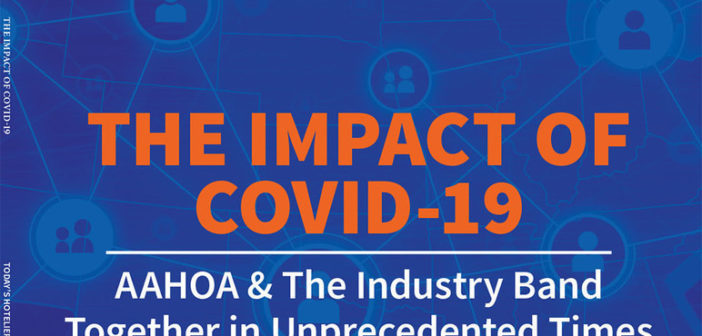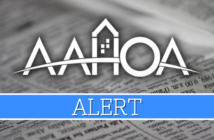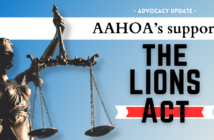A message to America’s hotel owners from AAHOA
Over AAHOA’s 30-year history, we’ve survived 9/11, we’ve come through the 2008 economic crash, and we’ve weathered recessions. Now, we’re knee-deep in a global pandemic. We wish we knew when things will return to normal. But until they do, AAHOA is here to provide America’s hotel owners with the resources, advocacy, and hope that you need so much right now.
The weeks and months ahead are likely to be long and uncertain, but if we lean on each other for support, learn as much as we can, work together, and keep a positive spirit, there is no doubt we will come through this more resilient than ever. This is why AAHOA was formed – because we recognized we are stronger together.
AAHOA’s commitment to providing America’s hotel owners with the information you need is unmatched. In a matter of days, AAHOA pivoted its entire education, communications, and resources strategies to meet the needs of its Members . This included a dedicated COVID-19 webpage (www.aahoa.com/covid-19), an Member email “hotline” ([email protected]), dozens of coronavirus-related webcasts – with as many as two airing per day – a robust government affairs strategy around federal, state, and local advocacy initiatives and immediate and regular contact with all brands, seeking the relief hoteliers need in these unprecedented times. While the situation changes daily, AAHOA is staying abreast of the latest developments and delivering hotel owners the information you need during a time of crisis.
More specifically, here’s where we’re focusing our efforts, and it’s critical that we each continue to share this information with members across the country. It’s equally important that all members read communications we’re sending out. We’re updating members every day with the info you need to know. Membership and participation in your association has never been more important, and it’s times like these that we realize the fundamental importance of this organization and the reason it was created so many years ago.
Government Advocacy: AAHOA continues to work with government leaders at the state and federal levels to explain how the pandemic will have a ripple effect on the economy, while advocating for an ease in regulations, access to capital, and no new burdens. Our number one priority is addressing the liquidity crisis our members are facing. While we’ve seen a positive impact as a result of our efforts, we need every AAHOA Member to answer our advocacy calls to action.
Brands Advocacy: AAHOA continues to engage with brand senior leadership every single day, and brands are continuing to update their owner-relief efforts. We hear you, and we’re having these important discussions. Importantly, they hear you too. As the situation changes daily, so do our efforts and the relief forthcoming.
Education: AAHOA is offering at least one coronavirus-related webinar per day to keep hotel owners informed. We also are publishing one-pagers and other resources on www.aahoa.com/covid-19 that are helpful for both franchised and independent properties. As frequently as you have questions, we have been sourcing industry-leading experts to provide the answers, and we won’t stop.
Communications: We are sending daily email and text message updates, we’ve created a dedicated website, are launching virtual events, and are addressing members’ calls and emails. And with AAHOA’s dedicated email address, [email protected], members can direct their questions and get answers fast.
As the situation continues to unfold over the coming weeks and months, AAHOA is here for you. And we’re not making ourselves available to just AAHOA Members – in effort to help every hotelier in America, AAHOA has made these resources available to everyone. It’s in times of crisis that we realize the importance of banning together to make a difference.
We stress that the most important thing right now is participating in – and encouraging others to participate in – each call to action with your elected officials, which can be found on our resource page at www.aahoa.com/covid-19. It has never been more important to have your voice heard at the federal, state, and local levels.
As an industry, we are resilient. As an industry, we pull together. As an industry, we will survive these times. While the landscape has fundamentally changed, we know we’ll rebound and be stronger than ever, and through it all AAHOA will be by your side.
Sound Off: How AAHOA Members Are Responding to the COVID-19 Pandemic
As the COVID-19 pandemic affects hotels around the globe, hotel owners are struggling with cancellations, declining revenue, and cash flow issues. Here’s what is top of mind for AAHOA Members as they navigate today’s murky waters.
by ALICIA HOISINGTON
As the hotel industry grapples with the fallout from the global COVID-19 pandemic, hoteliers are asking, “What does this mean for my business?” The answers they are finding don’t always offer concrete solutions. Nevertheless, the industry is attempting to forge ahead the best it can.
But it has not been easy, as daily reports continue to spell out just how dire the near future looks for the industry.
For instance, the U.S. Travel Association projects that decreased travel due to the coronavirus will inflict an $809-billion hit on the U.S. economy and eliminate 4.6 million travel-related American jobs this year. These employment losses alone will nearly double the unemployment rate from 3.5 percent to 6.3 percent. Directly hit are small businesses, which the U.S. Travel Association says account for 83 percent of travel employers. What’s more, the analysis shows that total spending on U.S. travel is set to plummet by 31 percent for the year, costing $355 billion. That’s more than six times the impact seen from 9/11.
DISAPPEARING REVENUE
The news is bleak, to say the least, and AAHOA Members are feeling the pain due to cancelled group business and a near-halt to corporate and leisure travel because of quarantines across the country. In a survey conducted by AAHOA in mid-March, members shared what’s keeping them up at night.
For one hotel owner, occupancy is dropping by as much as 40 percent to 50 percent on weekdays, and groups and events continue to cancel.
“This will affect business majorly in the short term. Long term, we believe travel will be slower to recover than other parts of the economy,” he said. “Also, will companies now choose to work from home even more? Will this now force all companies to cut down travel?”
Some Austin hotels have seen a 60-percent drop in revenue and average daily rate. “This will impact my bottom line and may put us underwater and into financial distress,” another hotelier commented.
Another hotelier saw $137,000 worth of reservations cancelled in just one day for the months of March and April. “Our management company is thinking we may still get to 50-percent occupancy, but they have dropped the rate to $130 from $150 a night plus cancelled breakfast,” he said.
With such a dramatic loss in revenue and with many prognosticators fearing the worst is yet to come, it’s not surprising that hotel owners are left wondering how they will continue to pay their bills and how their mortgages will be affected.
Those concerns are top of mind for many. Another hotelier has seen occupancy slashed by 50 percent or more within a week at all of its hotels, while future reservations are being cancelled every day. Occupancy for the group is forecast to be reduced by more than 60 percent to 70 percent compared with the previous year.
“We might be OK in the long term if this disaster ends in the very short term, like one to two months. But the question is: Can we stay in business until it happens?” he said. “The hotel business is mostly fixed costs and, normally, we cut ADR to gain occupancy. But in today’s environment, there is no business to gain.”
This hotelier has approached his lender to discuss the current situation, “but not much is promised, and so we are afraid that we might not be able to fulfill our obligations,” he said. “We need relief either on not paying our current expense or be given an interest-free loan so we can continue paying.”
Another hotelier in Plainsboro, NJ, has experienced a 50-percent loss in revenue and a 90-day deficit of $800,000, says financial relief is needed for at least 90 days in regard to taxes, the mortgage, and interest rates.
“We are falling short on cash, and we’re not able to sustain the fixed costs affiliated with the property,” he said.
Managing Labor
Labor, which often is one of the largest expenses for hotels, is one of the biggest concerns for AAHOA Members. With cash flow severely stunted or completely evaporated, hoteliers are struggling to keep employees on the payroll.
It’s a huge worry for many. “We have no ability to retain people when there is a limited amount of work to be done,” another hotelier said. “The workforce will be shrunk; we’re potentially looking at a 20-percent cut in the overall rosters.”
For many, the thought of not being able to keep employees working is one that hits hard. “Our employees need money to run their households. We have had most of our employees working with us long term. Since there is no income, we can’t pay them or can’t give them their normal working hours,” he said. “We need our employees to stay with us since they have been working with us for so many years. They are our family, and without them, we can’t run our business.”
Some owners are doing their best to retain staff, such as Al Nathu who has not laid off any employees. “As a matter of fact, I have not been paying myself as a business owner,” Nathu said. “I feel that our staff, who have been with us for so long, we owe them that much. Even in rough times, we try to do as much as we can.”
Another hotelier’s team is trying to keep its staff working by cross-training current employees and avoiding new hires for the typically busy summer season. The hope is that existing employees can keep working for the same amounts in their paychecks.
For a hotelier in Connecticut, their hotels have lost 60-percent occupancy in just over three days, and has had to ask employees to cut down on their hours in order to save on payroll. “We are trying to work with all of our employees to facilitate as much as work we can, but if the problem continues, we will be falling behind in paying bills,” he said.
Mike Patel, President of SAI Hotel Group, says he’s worried about how his employees will fare during this crisis.
“Our team members will be hurt greatly in health and financially,” Patel said. “We are worried about them and their families, but cash flow will be a large issue as well as having minimum staffing to properly take care of guests seeking shelter and safety. We need relief and assistance as small business owners and operators.”
FOR BRANDS, A CALL TO ACTION
Some of that relief needs to come from brands, owners say. First and foremost, many are calling on brands to either waive or reduce franchise fees and other fixed costs, especially for services owners are not receiving during this crisis. Others want brand-mandated standards to cease during the pandemic, like PIPs, inspections, enrollment mandates, guest surveys, and food service, while some are asking brands to give them more time to pay their invoices and to seek reduced rates with OTAs. While we have seen some relief, there are still many options yet determined. Where watching every dollar counts, the fees paid to brands and OTAs account for a large portion of franchised owners’ operating expenses.
“I would like to see the brands step up and reduce the franchise fee burden for properties that are hurting or offer a deferral program where the next six months of fees could be deferred and paid throughout 2021,” one hotelier said.
Mike Stohler, Managing Partner of Gateway Private Equity Group, says brands should give waivers on brand-required vendors so owners can reduce costs. Additionally, he says brands need to extend the deadline to complete property improvement plans. “Our biggest concern revolves around required PIPs,” Stohler said. “We hope our flags will give us longer periods to complete.”
Mili Shah wants to take it one step further. “Franchisors must cancel or extend all PIPs indefinitely for all of its brands until further notice,” Shah said. “Material and labor will not be available for a long uncertain future.”
And another says that now might be a good time for brands to renegotiate with third parties to lower commission rates. “Bring them to reality,” he said. “And it’s time to push more discounts on the brand sites.”
Some owners think brands should consider easing up on certain standards during this time, especially as many hotels sit empty or nearly so.
“They should consider rolling out temporary housekeeping to only service rooms every third day,” Sumeet Jetha of Jetha Group said. “Also, consider a temporary pause to having night audit present and put a pause on brand-mandated purchases, PIPs, and other high-ticket items.”
Sam Patel of Kisna Hospitality agrees. “Brands need to remove breakfast requirements and reduce brand standards that will help reduce expenses, as well as put a temporary halt on inspections and training requirements,” he said.
“All of us hoteliers are hurting,” Stohler said. “If we have to temporarily shut down, it’s to preserve capital in order to open back up again and rehire our staff. I found out that my flag will still charge me every fee they can outside of room revenue if I have to shut down.”
At the end of the day, owners want to be in business when this is over, and they need their brands to step up in every way possible to get through this together. These are unprecedented times, and the industry needs to band together to take the steps necessary on the road to recovery—and it has to start now, with every part of the industry doing its part.
U.S. Hotel Industry Could Take Five Years to Recover
Hotel asset management company Hotel Asset Value Enhancement (hotelAVE) released a study that shows it will take the hotel industry in the United States approximately five years to achieve pre-COVID-19 occupancy, revenue, and profitability. The pace of recovery from the pandemic will be extended after an immediate mini-spike beginning in May or June, according to the company’s “hotelAVE COVID-19 Hotel Outlook.”
To draw its conclusions, the company analyzed the historical data of past events related to the industry’s recovery after a crisis or health event, including the period following the September 11 attacks, the 2008 financial crisis, the Zika outbreak in Miami, and the SARS outbreak in Toronto.
In 2020, the report shows that the COVID-19 pandemic will cause hotel revenues in the U.S. to decrease 25 percent to 30 percent. If the progression of the virus in China and Italy is any indication, hotel occupancy in the U.S. will decrease to about 25 percent to 30 percent in March and 10 percent to 15 percent in April or worse if hotels continue to close either by reason of governmental mandate or financial necessity. For example, hotelAVE estimates that 15 percent to 20 percent of its hotels in the U.S. will close temporarily by the end of March because the fixed carry costs are less than the negative cash flow projected from staying open, as well as health-related concerns for employees. Other hotels are reducing services and available guest rooms to operate with a small staff.
The report notes that leisure hotels, especially in markets to which travelers can drive, will rebound more quickly than group business, which typically takes twice as long to recover. Additionally, those hotels that geo-target for “stay-cation” and capture leisure business from their local community will recover faster. While it might be difficult to do currently, the report also says that maintaining rate integrity and minimizing rate discounting will facilitate and accelerate recovery. Key industries such as government, health care, legal, and logistics will act as catalysts for business travel.
Top 5 States for Hotel-Related Job Loss Due to Pandemic
Based on current occupancy estimates, AHLA says that four million total jobs have been eliminated already or are on the verge of it. In certain affected markets, including Seattle, San Francisco, Austin, and Boston, hotel occupancy rates are already down below 20 percent, and individual hotels and major operators have already shut down operations.
The hotel industry supports about 2.3 million jobs directly and more than 8.3 million jobs total (direct hotel operations, guest spending, indirect supply chain and induced), according to an AHLA report. However, the dramatic declines in occupancy rates will lead to massive job losses for employees across the industry.
AHLA and Oxford Economics examined the numbers and determined how many hotel-related jobs are on the brink of being lost in every state due to the COVID-19 pandemic. Below are the top five states for job loss.



